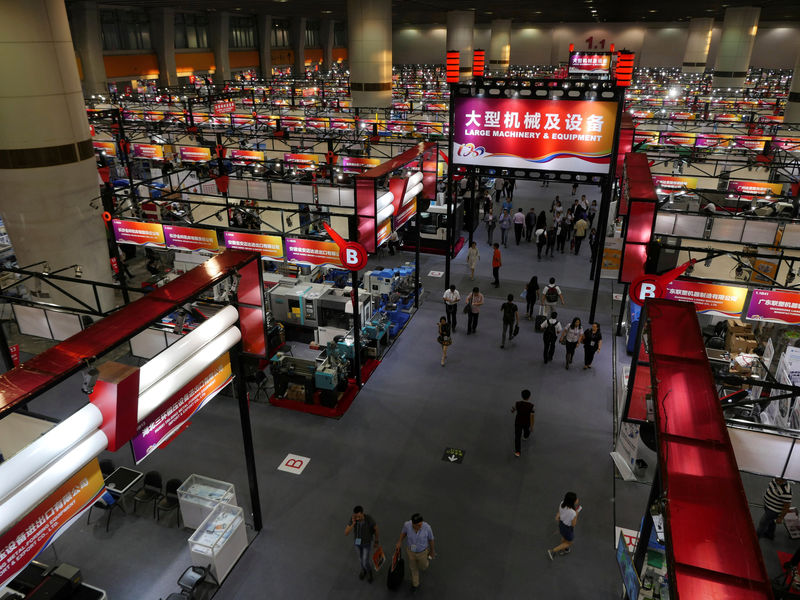By Clare Jim
HONG KONG (Reuters) - Official investment figures may be feeble, but exporters at China's largest trade fair say they are plowing more money into robotics, industrial automation and new product development to offset rising costs.
At the Canton Fair, which kicked off this weekend for companies in the household electronics, decorative materials and building sectors - other sectors follow later in the month - more than 80 percent of companies quizzed by Reuters said they would be spending more next year.
That would represent a significant shift if matched throughout China's economy. Official data on Wednesday showed private sector investment in fixed assets in the first nine months grew just 2.5 percent, picking up from a record low of 2.1 percent in the first eight months.
Kison Van said his company, Ningbo Cixi Import and Export Holdings, which makes fans and heaters, needs to develop three to four new products every year to stay competitive.
"It's important to continuously invest in R&D because once a new product comes out, you see it everywhere at the Canton Fair," said Van, one of tens of thousands of salesman at a fair that sprawls over 1.2 million square meters, almost twice the size of the world's largest mall.
More than 65 percent of the 103 exhibitors polled by Reuters in China's southern city of Guangzhou expect to boost spending by up to 20 percent in 2017, while 16.5 percent expect to raise spending by more than 20 percent.
That will be welcome news to leaders in Beijing, as China's private companies, which make up the bulk of exhibitors at the fair, are a crucial engine of growth for the economy, unlike the largely inefficient and indebted state-owned sector.
Chinese growth slowed to a 25-year low of 6.9 percent last year, and third-quarter figures released on Wednesday put it on track for about 6.7 percent this year.
Economists say the country's mid-sized private companies are the primary source of investment, innovation and productivity growth.
Heavy machinery manufacturers at the fair said they spend over 30 percent of their investment capital upgrading production lines each year, while many building materials and household equipment makers said they were pumping money into automation.
China is achieving average annual growth of 18 percent in research and development (R&D) spending, compared with just 1.4 percent across the rest of the world's upper-middle-income countries, according to the UNESCO Institute for Statistics.
While most exporters surveyed aim to boost spending, around 20 percent said they planned to cut investment. Other sectors that may be under pressure as global growth slows, such as textiles and apparel, will feature later at the fair, which runs until Nov. 4.
RISE OF THE ROBOTS
China is increasingly moving to modernize its manufacturing industry with robotics and automation, driven in part by a shortage of skilled workers and rapidly rising wages that threaten to erode its appeal as a low-cost workshop to the world.
"Robots do a better job than workers; the quality is more stable," said Zhejiang Momali Sanitary Utensils Co general manager Selina Song.
Song said, however, that a drop in sales was slowing the company's push to boost automation.
Some economists said new and emerging sectors such as high-end manufacturing equipment would see more room for development.
"It's because these sectors get the government's support. They still see more room to grow despite slowing economic growth globally," said Nomura China economist Wendy Chen, who is based in Shanghai.
Liu Qian, deputy general manager of Nanjing Panda Electronics Import & Export Co, said investing in robots and automation was crucial, given wages had doubled in five years.
Several Chinese provinces have slowed or halted increases to minimum wages this year, as companies face pressure from rising expenses and weakening global demand, something that is also prompting more companies to shift sales to within China.
Liu acknowledged it would take longer for some companies to break even, given the size of the initial capital injection in automation and robots.
China is aiming for a top-10 ranking in automation for its industries by 2020 by putting more robots in its factories, according to the International Federation of Robotics (IFR).
Torpedo Hsu, sales manager at heavy-machinery transmissions maker CMEC, said the company plans to invest 10 to 20 percent more in spending next year, which it hopes will lead to a pick-up in orders after an expected 10 percent fall in export orders this year.
"Our company's strategy is that when the business is not doing well, we spend more," Hsu said.
